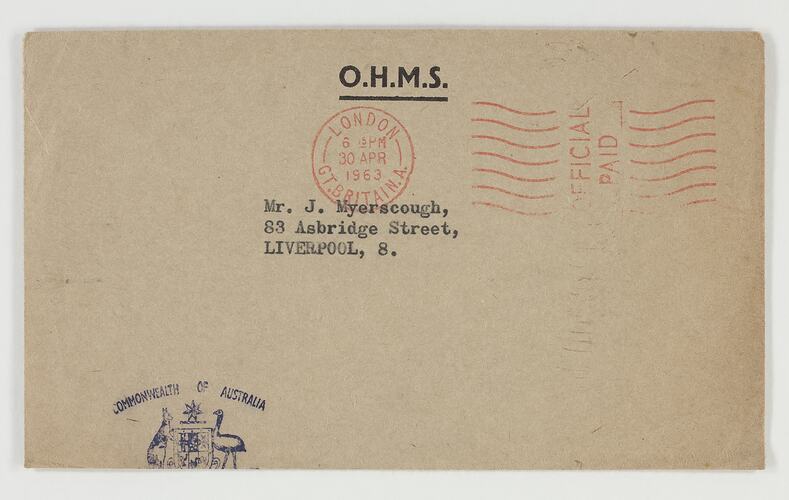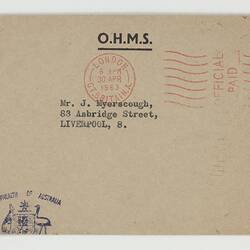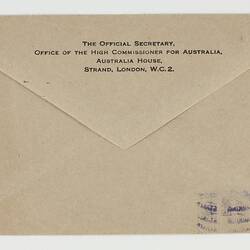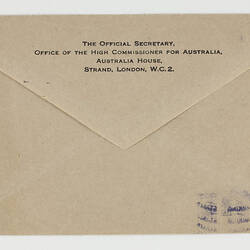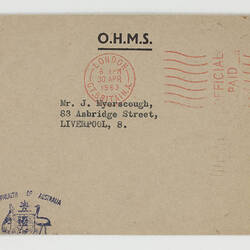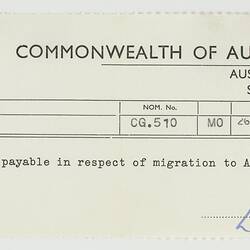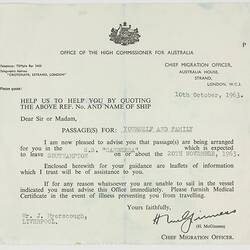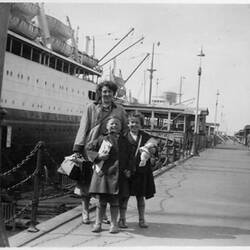Summary
Envelope that contained a receipt of sums payable in relation to migration expenses to Australia. The envelope was part of the application and acceptance process for the Myerscough's to migrate from England to Australia in 1963.
John and Doreen Myerscough migrated to Australia from Liverpool in England with their daughters Jill and Julie on 20 November 1963. Searching for greater opportunities and with savings behind them, they took advantage of the Australian Government's 'Nest Egg Scheme'. They were also assisted ten pound migrants. The family sailed on the P&O Orient Line SS Canberra and settled in Melbourne where the climate was said to be similar to that of England. They transferred directly to Altona Migrant Hostel and ended up staying there (most unusually) for two years. John worked on the Geelong-Melbourne oil pipeline, in construction, and as a sub-contractor all over Victoria installing ceilings. Doreen had another baby Paul and later worked at Rothman's cigarette factory in Brooklyn. The couple purchased a block of land in Melton, promoted as a growth suburb, but the potential for isolation, as well as the couple's inability to really get ahead, made them decide to give up the dream and return to England. They paid their full fares, sold their land and returned to Liverpool on the P&O Orient Line SS Oriana on 21 January 1966. However, the challenges they experienced inspired them to strive and succeed, and John and Doreen have subsequently become frequent tourist visitors to Australia.
Physical Description
Brown envelope with black text. Red post office stamp. Blue Commonwealth of Australia stamp. Stamped London, Great Britain 30/4/1963. Addressed to: Mr J Myerscough 83 Asbridge St, Liverpool 8. Also has stamp of Commonwealth of Australia shield and emblem.
Significance
The Myerscough migration documents collection offers the unique opportunity to record the experiences of a migrant family who returned home. It is extremely difficult to capture the narratives of the people for whom migration was a negative or unsuccessful experience and who cut their losses and left. Return migration by its very nature is challenging to document through memory and material culture from the receiving country as people tend to be geographically distant, as well as frequently reluctant to record their negative experiences often accompanied by a sense of failure.
More Information
-
Collecting Areas
-
Acquisition Information
Donation from Mrs Doreen Myerscough, Mr John Myerscough, 17 Jan 2007
-
Issued To
-
Brand Names
-
Classification
Migration, Processing - planning & departure, Financial records
-
Category
-
Discipline
-
Type of item
-
Overall Dimensions
9 cm (Length), 15.2 cm (Width)
-
Keywords
Migrant Hostels, Nest Egg Scheme, Return Migration, Shipping Lines
